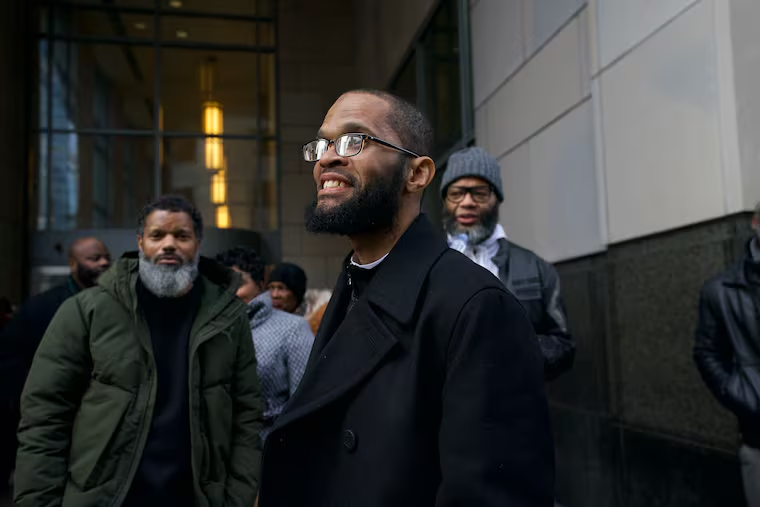‘This is nothing after 28 years in prison’: Philly exonerees on how to survive isolation
“When you been through what I been through, being here is not a problem. There’s much I can do. You have to be creative. You better have something to do with your mind.”

During the nine months Mark Whitaker spent in solitary confinement in a Philadelphia jail cell — the home stretch of 17 years of wrongful imprisonment — he learned to focus on minor pleasures, like a small plastic radio bought from the commissary. He’d been in rural prisons in remote corners of Pennsylvania; suddenly he was back in the city, able to listen to local news, hear his hometown sports teams.
Some nights, as the 76ers warmed up a few miles away, he’d shout down the corridor to the other men locked in their cells for 23 hours a day. “I would tell them, ‘You all got your radios? The game’s coming on. You all want to go to the game?’ One guy hollered, ‘I want to go.’ So I said, ‘Come with me. I’m gonna drive down!’ We escaped for a little bit, and we all went to the game.”
Whitaker, acquitted in a retrial last year of a 1999 murder, was just finding his footing in free society when Pennsylvania’s stay-at-home order slammed him back into isolation. He lost his landscaping job, and his financial outlook is precarious.
Like other recently released Philadelphia exonerees, though, he feels uniquely prepared to withstand a moment when it feels like the whole country is in “the bing," as prisoners call solitary confinement.
“When you been through what I been through, being here is not a problem. There’s much I can do," he said. But now, as in prison, “you have to be creative. You better have something to do with your mind.”
Theophalis “Binky Bilal” Wilson — who in January was exonerated in a 1989 triple murder — said he had fielded frequent phone calls for advice on surviving the prolonged shutdown.
First, he puts it in perspective. “This is nothing after being locked up for 28 years,” he said. “This is easy.”
Then, he encourages those who ask his advice to pray — and wash their hands. He also harbors some hope that the situation could spark greater empathy for those in prison, including many of his friends at State Correctional Institution Phoenix, where the coronavirus has been spreading.
“Now, the whole country is incarcerated,” he said. "This is a microcosm of what a person experiences when he is incarcerated: being restricted and being in fear. This virus locked the whole world down.”
It’s hard to be on house arrest just as his life was restarting. He said public-health measures had interrupted his plans to begin work at a law firm helping to free other wrongly convicted people, and to travel to New York and Kansas for speaking engagements at law schools. But unlike prison, there are furloughs, he noted: Gravel crunched underfoot as he spoke by phone while walking through Wissahickon Valley Park, marveling at the beauty within city limits.
Terrance Lewis is also processing the pandemic with equanimity earned over 21 years of wrongful imprisonment. Now, he said, he can look out a window, even open it, without seeing bars, mesh, or razor wire.
“As abnormal as it is, this is what I was conditioned for," he said. When he saw the supermarket shelves devoid of toilet paper, he shrugged. “I already know how valuable toilet paper is, trust me. I seen people put themselves at harm’s way for one roll of toilet tissue.”
But an irony is that after years of fighting to be let out, now he cannot afford to stay home. Pennsylvania is one of a minority of states that provide no compensation for the wrongfully imprisoned, so Lewis recently took a job at a homeless shelter to generate some income.
What carried him through prison, and now the pandemic, is faith.
“My belief was, and still is, that God almighty does not place a burden on a soul more than it has the strength to bear," he said. “Once I put that in my heart, I was able to do the things that was necessary for me — such as take care of my health, work out. You got to do these things so you don’t go insane. You got to cherish that which you do have. It allows you to cope with that which has been taken away.”
One thing all agreed on: The restrictions that Americans are chafing against don’t compare to a real lockdown.
“Please stop using that language,” said Johnny Berry, who was a teenager when he was imprisoned for a murder he didn’t commit. He was cleared last year after 24 years in prison.
“Lockdown means having your liberties taken from you, being in a place you don’t want to be 24/7, feeling horrible," he said. “Out here, the beauty of it is, we have all these different distractions — so many wonderful things out there to distract our attention.”
His endeavors, a demolition and clean-out company and a mentoring program called Real Street Talk, have been set back like everyone else’s. But the way he looks at it, “Now is the time to put things in perspective and get some things done. You find a course, and you stay the course. It helps you cope — at least it did for me.”
And unlike a life sentence, he said, this stay-at-home order will end.
“I’ve been through the most frustrating situation on Earth almost,” Wilson said. “Now, I’m enjoying life. I’m free after 28 years. How can I be frustrated?”